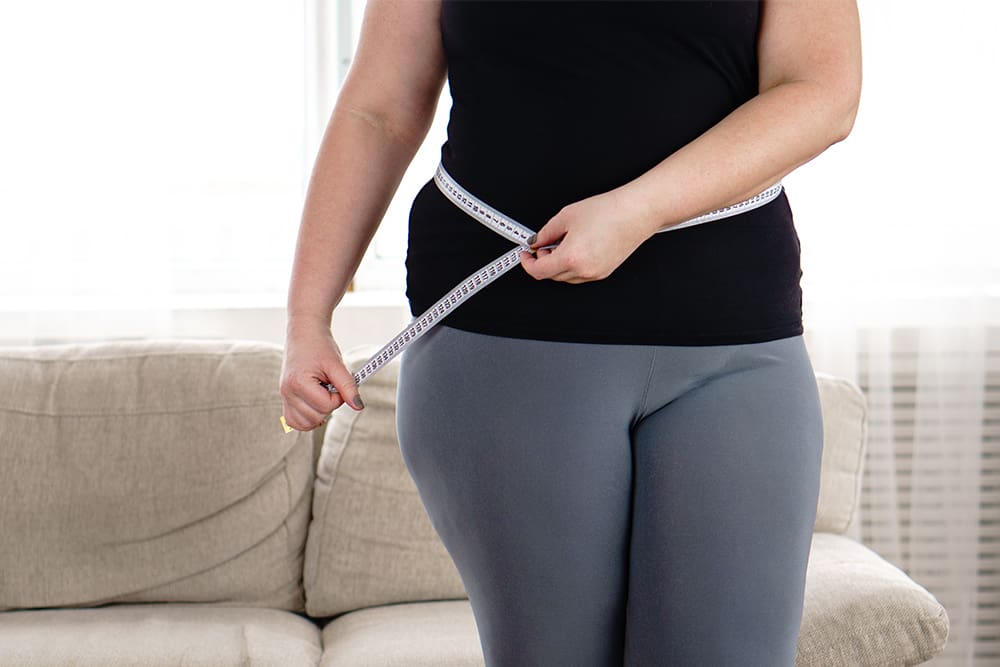Reviewed By Blake Gilliam, CRNP
Reading Time: 4 minutes
If you are frustrated by weight gain in menopause, you are far from alone. Many women are surprised to see the scale go up despite healthy habits. The truth is, menopause sets off hormonal changes that make it harder to keep weight off—and even harder to lose it.
In this blog, we will explain why these changes happen and share practical ways to support your metabolism, protect your health, and feel more in control of your body.
Table of Contents
Key Takeaway
Successful weight loss during menopause starts with understanding how hormonal changes affect your metabolism and body composition. With the right combination of nutrition, exercise, stress management, and hormone replacement therapy, you can support your health and feel more like yourself again.
Understanding Menopause Weight Loss Challenges
Many women feel blindsided by the sudden shift in body weight during menopause. The habits that worked in your 30s or 40s, like watching calories and staying active, may no longer move the needle.
This phase of life comes with major biological changes that influence fat storage, muscle mass, and energy levels.
How Menopause Changes Your Body’s Metabolism
Hormonal shifts in menopause trigger biological changes that slow down your metabolism and shift how your body stores fat.
The Role of Estrogen Decline
Estrogen helps control where fat is stored and how your body uses insulin. As estrogen levels drop during menopause, fat storage shifts from your hips and thighs to your belly. This happens because lower estrogen makes abdominal fat cells more active in storing energy and releasing inflammatory chemicals.
Belly fat increases insulin resistance, which means your body has a harder time processing blood sugar and burning fat efficiently. Together, these changes make it much easier to gain weight around your midsection and much harder to lose it with diet and exercise alone.
Slower Resting Metabolic Rate
As you age, you naturally lose lean muscle mass, especially if you are not regularly doing strength training. Because muscle burns more calories than fat, having less muscle means your body needs fewer calories to function.
Over time, this slower resting metabolism makes it easier to gain weight, even if you have not changed your eating habits. This is why the same diet and exercise routine that kept your weight stable in your 30s or 40s may no longer work as you get older.
Insulin Resistance and Blood Sugar Spikes
Lower estrogen levels reduce insulin sensitivity, so your cells do not respond to insulin as well as they used to. This makes it harder to move sugar out of your bloodstream and into your cells for energy.
Instead, more of that sugar gets stored as fat, especially around your belly. Even cutting calories may not be enough to overcome these changes, which is why many women find weight loss so frustrating during this time.
Stress, Cortisol, and Sleep Disruptions
Chronic stress and poor sleep are common during menopause, and both can work against your metabolism. When you are under stress or not sleeping well, your body produces more cortisol, a hormone that encourages fat storage in the midsection.
Sleep deprivation also disrupts the balance of ghrelin and leptin, the hormones that control hunger and fullness. This combination can lead to stronger cravings, more overeating, and a cycle of weight gain that is hard to break.
Learn more about Hormonal Sleep Issues.
Why Diet and Exercise Alone May Not Be Enough
You can be eating well and working out consistently and still feel like nothing is changing. That is because hormonal shifts during menopause affect how your body responds to food, exercise, and stress.
Strict dieting can actually make things worse by increasing cortisol levels, which further promotes fat storage. Overtraining without enough rest can also disrupt hormones and stall progress. Even the healthiest habits need to be adapted to fit your body’s new reality during menopause.
So what can you do to break this cycle and start seeing results again?
How Hormone Therapy Can Support Menopause Weight Loss
Restoring hormone balance is often the missing link for women who have tried everything else. When estrogen and other hormone levels are optimized, your metabolism can start working more efficiently again.
Estrogen therapy has been shown to reduce belly fat by improving insulin sensitivity, lowering inflammation, and decreasing the buildup of visceral fat that raises the risk of heart disease.
Bioidentical hormone replacement therapy (BHRT) goes a step further by using plant-derived hormones that closely match what your body naturally produces. BHRT can help you maintain lean muscle, stabilize your mood, and improve energy levels, all of which make it easier to stay active and eat well.
At Madison Integrative Medicine, we create customized BHRT plans based on comprehensive lab testing and your individual health goals. With the right approach, hormone therapy can safely rebalance your metabolism and support sustainable weight loss, so you can feel more like yourself again.
Hormone Replacement Therapy in Madison, AL
If you are ready to take control of your health during menopause, our team is here to help. At Madison Integrative Medicine in Madison, AL, we offer hormone replacement therapy tailored to your unique needs. With the right support, you can balance your hormones, improve your well-being, and feel more like yourself again.To book an appointment at our wellness center in Madison, AL, call (256) 325-0955 or visit us at 1230 Slaughter Rd Suite C, Madison, AL.

